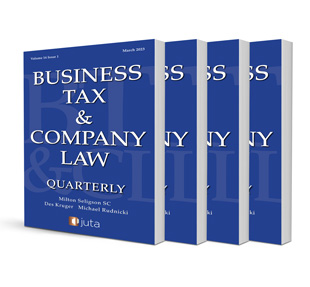
Protecting the Public Purse with Moral Tax Administration
Author: Fareed Moosa
ISSN: 2219-1585
Affiliations: Associate Professor: Department of Mercantile & Labour Law, Faculty of Law, University of the Western Cape
Source: Business Tax & Company Law Quarterly, Volume 14 Issue 3, 2023, p. 23 – 29
Abstract
This article engages with the scourge of tax immorality, an unsavoury practice adversely affecting state resources which puts South Africa’s democracy and its social transformation programme at risk. This article argues that tax immorality must be combatted head-on. To this end, it is contended that the bilateral and multi-lateral co-operation agreements concluded by the government of South Africa with their counterparts in Africa and beyond are insufficient to effectively combat tax non-compliance in all their manifestations. This is because there is no single reason for taxpayers acting in breach of their duty to the fiscus. As a result, it is argued by the author that a multi-pronged approach is needed which demands of tax administrators that they be innovative in their thinking and creative in their strategies. The nub of the thesis advanced is that, in practice, there is a correlation between, on the one hand, failure by tax authorities to fulfil their tax administration obligations with integrity and, on the other, failure by some taxpayers to comply with their tax related duties. It is further argued that conduct un-associated with a dignified tax administrator, and which may well contribute to tax immorality, includes hostility towards taxpayers, disrespect for the law and the rule of law, abuse of power, coercion, partiality, bias, threats, unethical behaviour, maladministration, and corruption. Conduct of this nature is antithetical to the final Constitution, 1996 and its democratic values and principles, all of which apply in the realm of tax administration being a facet of public administration governed by the Constitution. Finally, the author concludes that the South African Revenue Service can promote tax compliance by ensuring that it operates efficiently as an institution and that its officials act in accordance with the law and without favour, and with fairness, honour, dignity, decency, responsiveness to taxpayers’ needs, and open-mindedness.